To view this content, you must be a member of the Rose City Review Patreon
Already a qualifying Patreon member? Refresh to access this content.
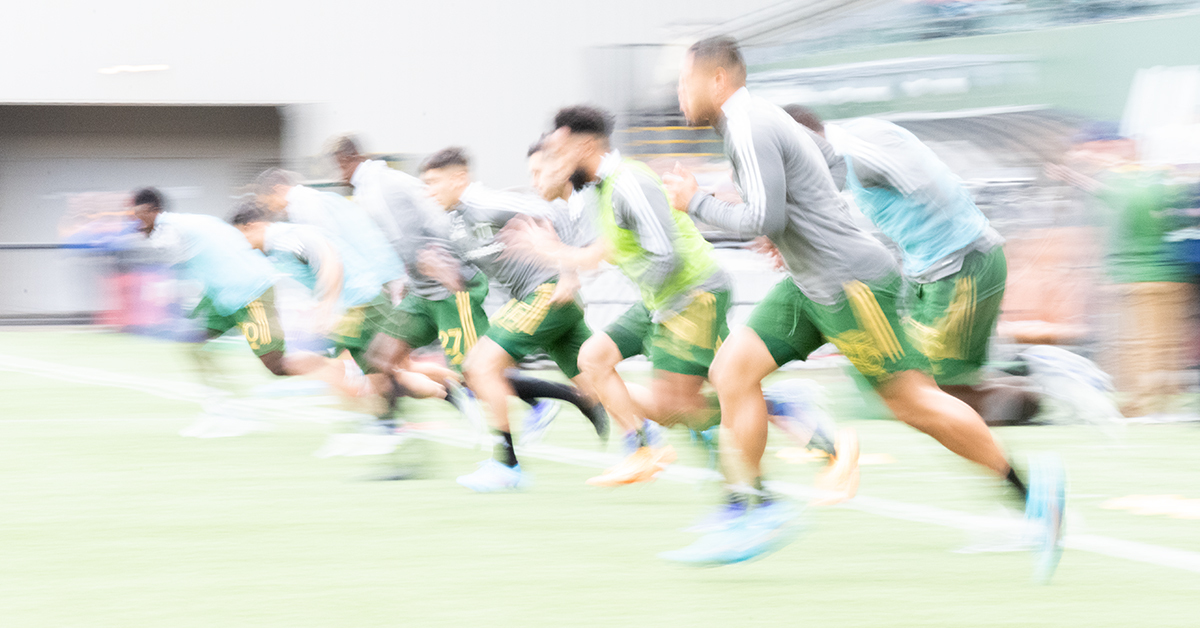
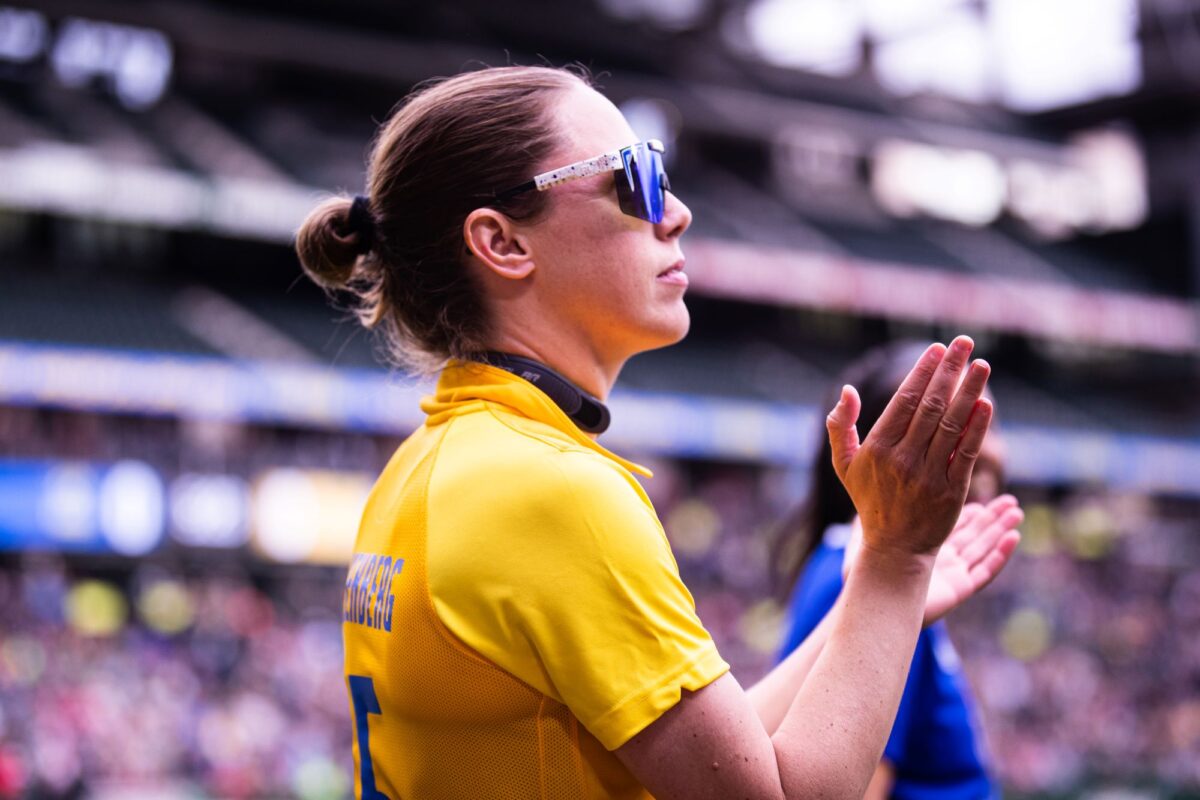
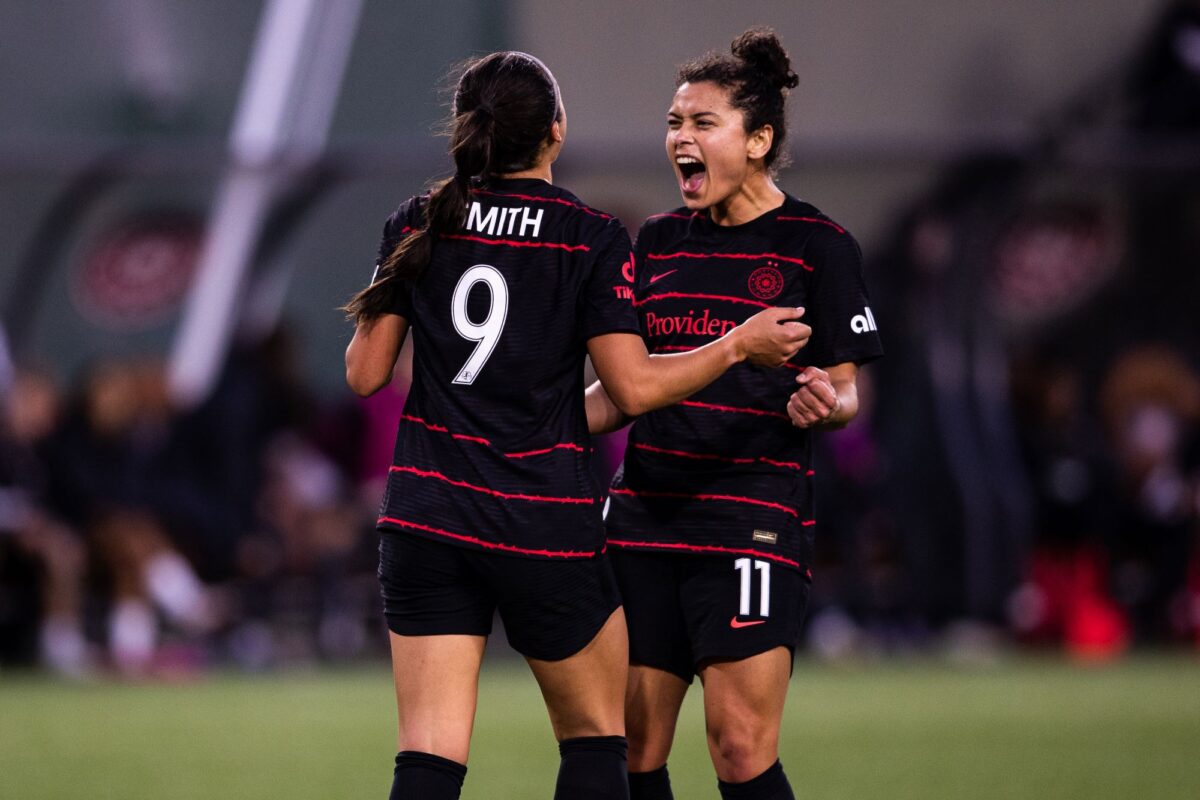
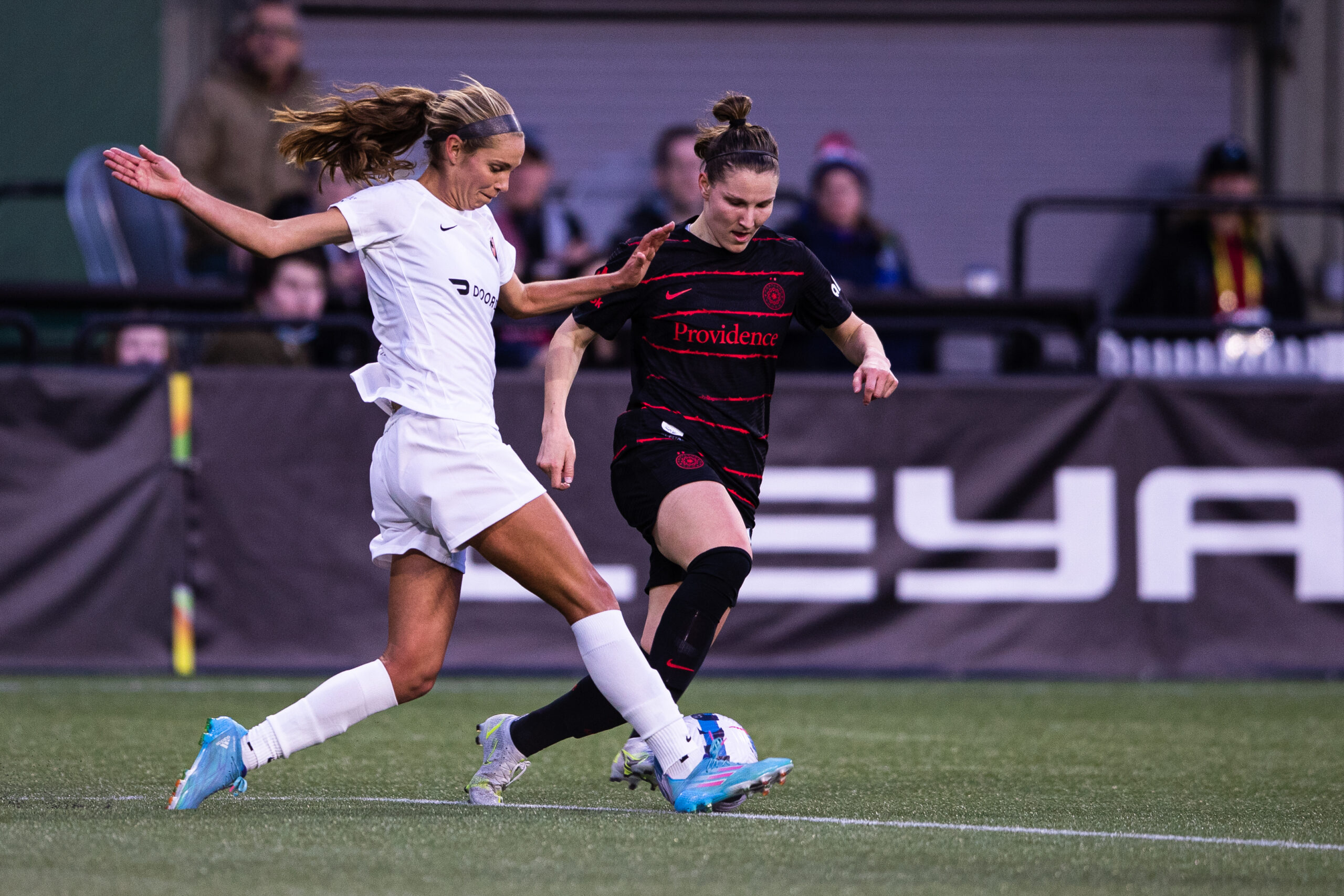
Sunday’s game against Angel City was world’s apart from the Thorns’ first game against them. After beating Los Angeles last time around, the Thorns bowed out of the Challenge Cup in the group stage with a 1-0 loss.
It’s impossible to analyze this game without talking about the five players and head coach Rhian Wilkinson’s absences due to COVID-19 protocols. Sophia Smith, Meaghan Nally, Hina Sugita, and Sam Coffey had all solidified their spots on the Thorns’ starting eleven. A preseason tournament is the ideal time to test out and formulate a consistent starting roster, especially after the turnover the Thorns experienced in the offseason. In the postgame presser, Meghan Klingenberg said that “COVID has been disrupting the world for two years, and now it’s closer to home than it has been. It’s been great to see players on the field who don’t normally start.”
As COVID-19 policies begin to relax nationwide—despite us still being in the midst of a deadly viral pandemic—NWSL teams are going to be caught in the crossfire. This is especially prevalent in the lifting of the federal mask mandate on transportation, as NWSL players do not fly chartered planes. With the country deciding that COVID-19 has ended, long lists of COVID-protocol related absences for teams could become more commonplace, no matter how tight the teams bubble is or how diligent they are in their masking.
Despite the absences, the Thorns were able to put out a great starting eleven, showcasing the depth and quality of their team. Young Olivia Moultrie got her first start of the calendar year, and Janine Beckie played a full 90 minutes on her debut game for the Thorns. Acting coach Mike Norris said after the defeat that the “challenging week” was “no excuse for the team’s poor performance.”
Last year, the theme of the Thorns was about building a strong culture. With a new head coach, it’s inevitable that the culture will shift, and a new one needs to be created. In the final game of the Challenge Cup, the Thorns were forced to test the strength of that new mentality.
During the tournament, the Thorns debuted two primary formations, a 3-5-2 and a 4-3-3. With the change of formation and change of head coach comes a change of principles. Unfortunately, it seems as though the Thorns have lost their way in recent games. The second half of the game against San Diego and all 90 minutes of play against Angel City felt uninspired and lacked urgency. The Thorns were unable to score in those 135 minutes and allowed three goals.
With eight shots total against Lost Angeles, three of which were on target, the Thorns didn’t look nearly as threatening as they normally do.
At no point after Angel City scored their penalty kick did I believe that the Thorns were going to score an equalizer. The midfield was nonexistent, and the forwards were not making the necessary runs in the box when the ball was crossed. The game was a must-win if the team wanted to move onto the semi-finals of the Challenge Cup and defend their title, yet it felt as though there were no stakes. Going down in the first half of a must-win game needed to turn on a fire for the Thorns, but it didn’t. Like Kling said postgame, “the team got away from their principles.”
While the league itself is making the Challenge Cup seem more like a joke with each announcement (Reign having to host their semi-final game at Segra Field, anyone?), the Thorns needed to use the tournament to try and gain chemistry, especially between pairings. Unfortunately, they ended the tournament poorly.
Still, it’s important to remember the extenuating circumstances. The stress of playing sports in the middle of a (still ongoing) global pandemic is hard enough when there aren’t national or league-wide safety procedures in place to help protect players and staff. Emotions are high, and it’s important to remember that the athletes on the field are people. The Thorns didn’t play with intensity or drive like they normally do, but they are still the Portland Thorns, and there is always another game for them to play.
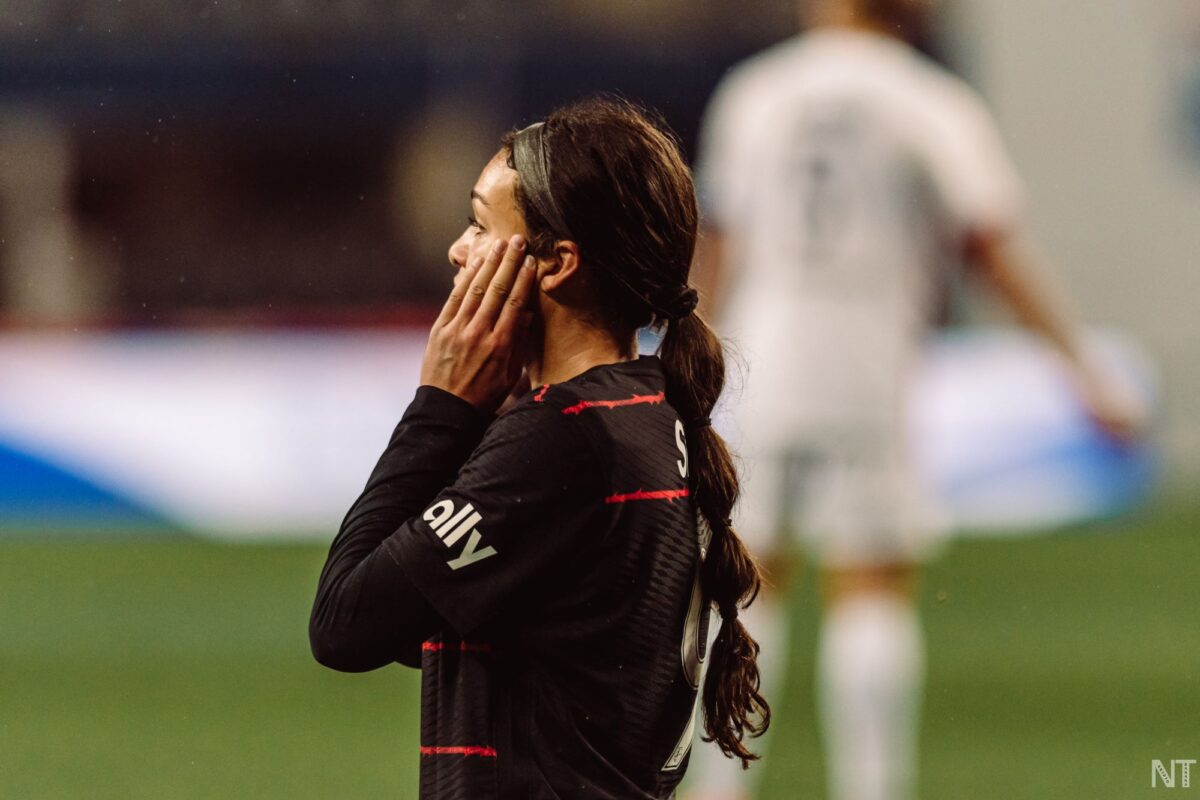
The Thorns earned a 3-2 win against the San Diego Wave on Sunday, knocking the Wave out of the running for the Challenge Cup semifinals with a strong first half. Still, Portland’s second half left room for improvement.
For the first time this year, the Thorns played a 4-3-3 formation, with Meghan Klingenberg, Kelli Hubly, Emily Menges, and Meaghan Nally spread across the defense and Sophia Smith, Christine Sinclair, and Morgan Weaver sitting as the front three.
Head coach Rhian Wilkinson said after the game that the Thorns are using the Challenge Cup to gradually add in different tactics that she wants the team to use throughout the regular season. “To have two weeks without a game when the internationals went, I felt like it was the right time to to deliver a new structure,” Wilkinson said.
The formation meant the Thorns didn’t have as many numbers wide, and, unsurprisingly, they played more through the middle as a result. We can see that through the average player positions between the Thorns’ last game against OL Reign—where they played a 5-3-2—and Sunday’s game against the Wave, where players are more clustered in the center of the park:


“What I’ve loved is I think you can see this team buys in,” Wilkinson said of the new formation. “They trust one another.”
That trust was evident in the first half. The Thorns dominated those 45 minutes, winning balls, controlling the midfield, and getting chance after chance off. They ended the half with 16 shots to San Diego’s four and a 3-0 lead to show for it.
Smith opened the scoring in the fourth minute when she got on the end of an on-the-ground cross from Weaver, touched the ball just around her defender, and sent a shot into the far corner that San Diego’s Carly Telford wasn’t able to react to in time.
Portland struck again in the 21st and 41st minutes, as Hina Sugita tallied her first two goals for the team. In both cases, she exposed San Diego’s defensive marking, getting on the ends of rebounds to hit the ball into the back of the net. And it doesn’t hurt that they were both fun to watch:
Hina Sugita scores her first NWSL goal to put us up by 2. Congrats Hina!!! #BAONPDX pic.twitter.com/T1ZPZxTp43
— Portland Thorns FC (@ThornsFC) April 17, 2022
Thoughts anyone? 🧐🤔 #BAONPDX pic.twitter.com/DzvUlisCqx
— Portland Thorns FC (@ThornsFC) April 18, 2022
“If you’ve watched her the last few games, this is what she’s been doing,” Wilkinson said of Sugita. “I think she’s just gaining in confidence every game and did very well today.”
But if the first half was a breeze for the Thorns, the second half was anything but. San Diego brought in rookie Kelsey Turnbow after the break, and she immediately went to work terrorizing Portland’s defense. In just the first minute, she played a perfect ball into Alex Morgan, whose shot left Bella Bixby scrambling to her feet as Bella Briede picked up the ball at the top of the six and buried her shot.
The game’s momentum shifted in favor of the Wave after that, with San Diego growing into the midfield and forcing the Thorns into a lot of last-ditch defending. San Diego got of 13 shots in those final 45 minutes, while Portland managed only two. “Our talk halftime was keep the standard up,” Sam Coffey said after the match, “and we didn’t do that.”
Taylor Kornieck further cut into the Thorns’s lead coming off the bench in the 67th minute, scoring a header off a Wave corner kick by virtue of her positioning and being tall.
Although the Thorns were able to hold onto the win, it was a gritty end to a dominant start. “Something Rhian really emphasizes for our group is winning the right way,” Coffey said. “I don’t think we we did that to the best of our ability.
“That doesn’t mean that we hang our heads low or we’re all disappointed, but it’s fuel for the fire,” she said. “I think that’s a good thing for this group, especially with another game just around the corner.”
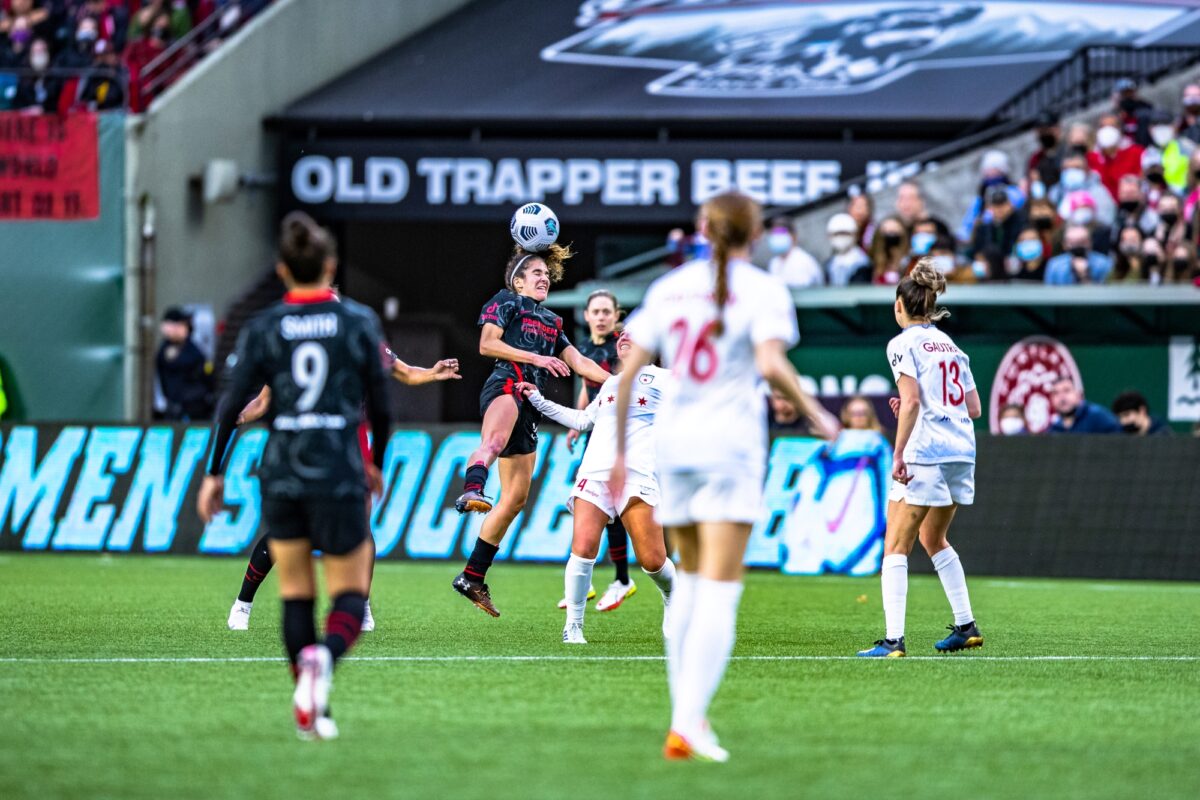
Wednesday night’s inaugural game against Angel City FC saw several Thorns professional debuts in a decisive 3-0 victory. The Thorns dominated on every stat except possession and played a high-press game, particularly in the second half. Portland ended the night with 14 shots—seven of which were on target—and 13 crosses, all of which were double what Los Angeles was able to produce. Despite being early into preseason with several key players out on injury or limited minutes, the Thorns are looking strong and cohesive, and the numbers reflect that.
I’ve attended all of the Thorns games thus far, this was by far the most fun. Nearly 10,000 people attended a mid-week game, which brought a lively atmosphere into the Park. The purple smoke for domestic violence was sent off and the “YOU KNEW” banner flew, reminding everyone about the horrific actions of the front office. On the field, however, the team seemed as though they were having fun and enjoying themselves and the freedom they are given on the field, which is amplified by the crowd.
Three different players scored on Wednesday—including Yazmeen Ryan, who tallied her first professional goal. And, because I think scoring goals is really fun, I am going to attempt to break down what went well to allow the Thorns their first multiple-goal game of the 2022 Challenge Cup.
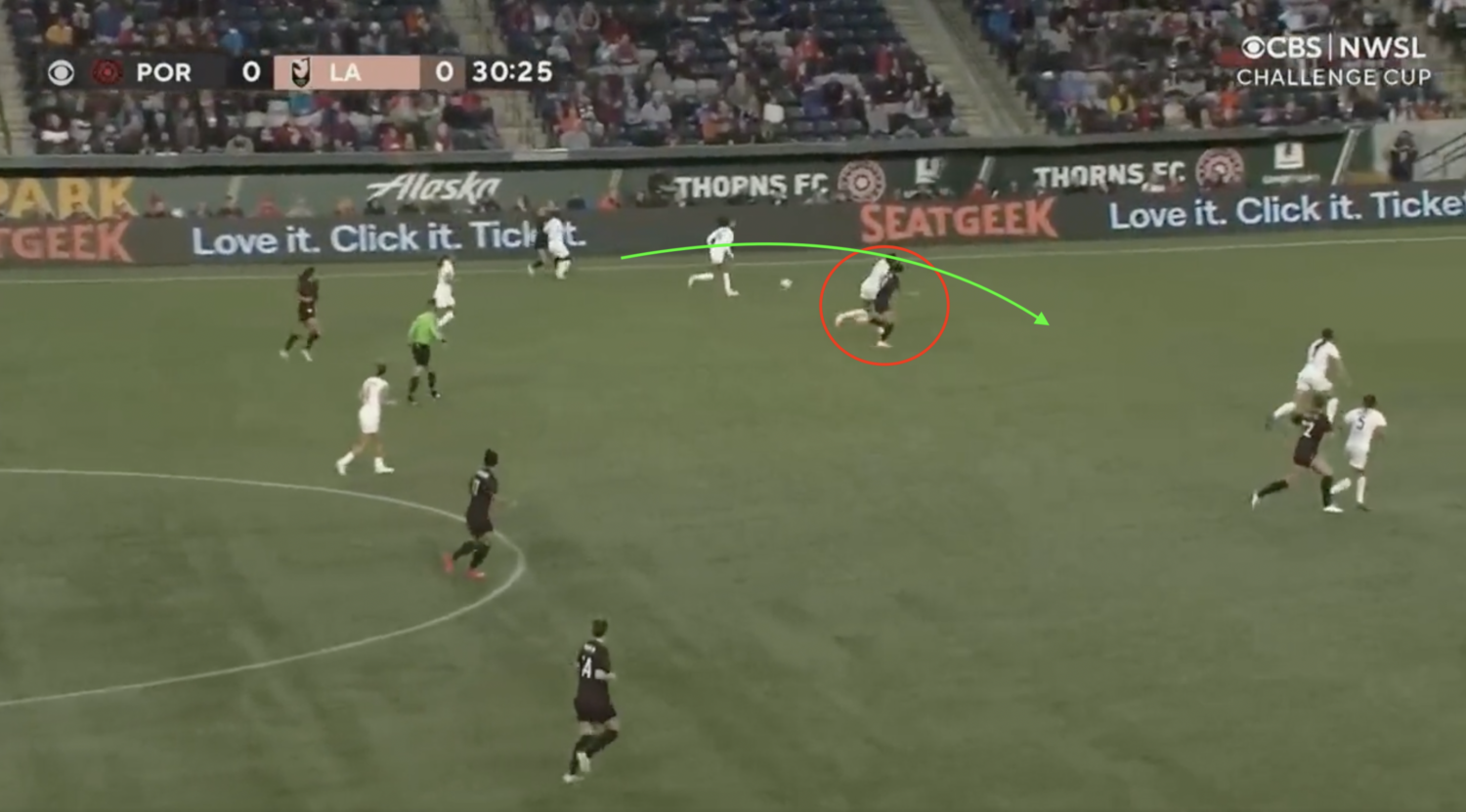
In the screen cap above, Sophia Smith is the red circle, and the green arrow is the trajectory of the ball played in by Natalie Beckman. Smith gets on the inside of her defender and has the pace to outrun her. If Beckman plays the ball too far ahead, or too hard, there are two Angel City defenders who are ahead of Smith to reach it first. With the quick movement of her hips and feet, Smith is able to fake out the defender on her shoulder and sit her down. From there, she has a clear path to goal.
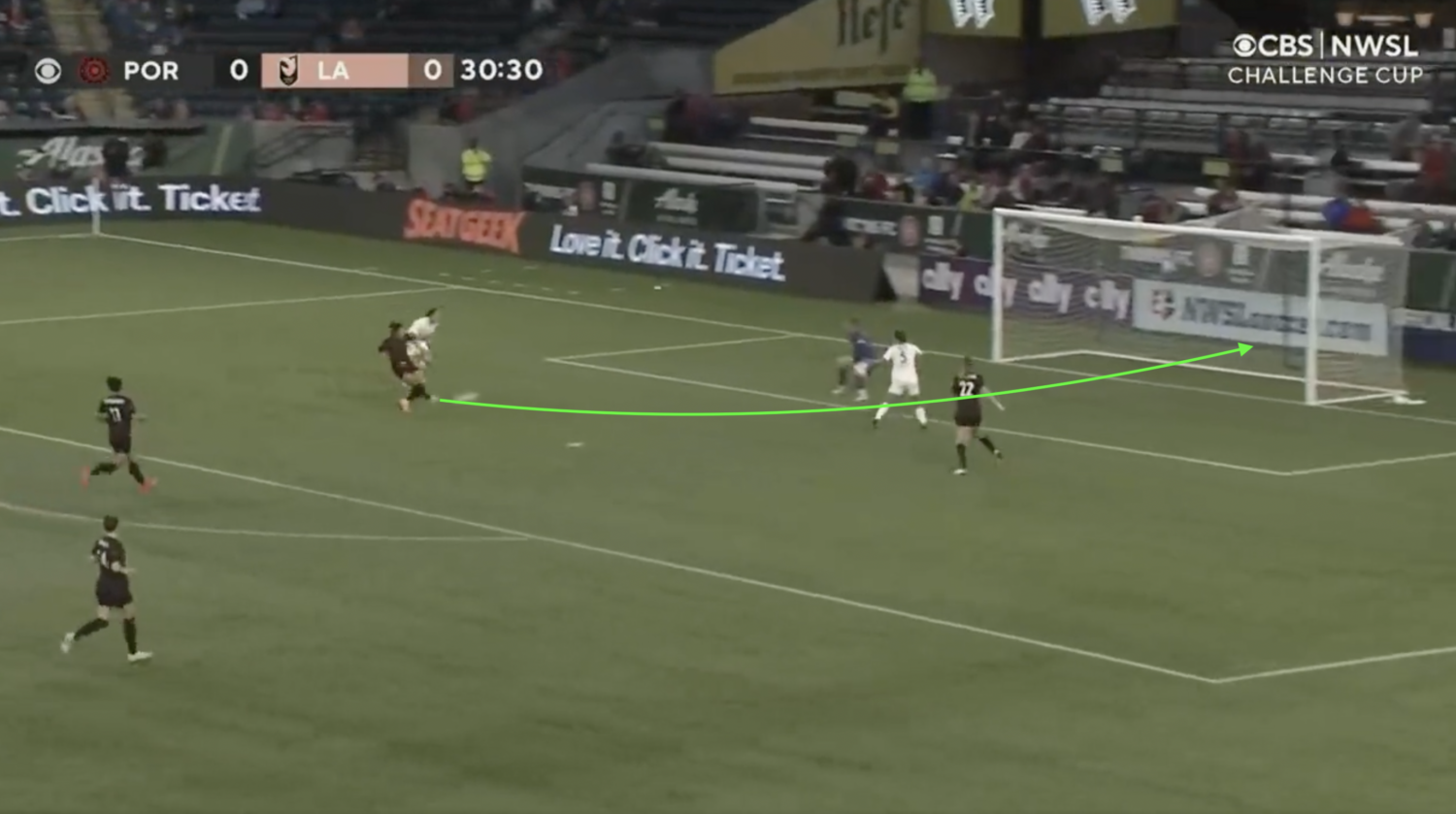
When Smith reaches the inside of the penalty box, she is able to put the ball on her preferred right foot and deftly place it in the lower left corner of the net, out of reach of the Angel City goalkeeper. Postgame, Smith talked about how her shooting accuracy has been something she has developed through repetition, largely alongside Morgan Weaver. Seeing the fruits of training pay off in a game is very fulfilling.
Ryan scored the second goal off a rebounded bullet shot by Natalia Kuikka.
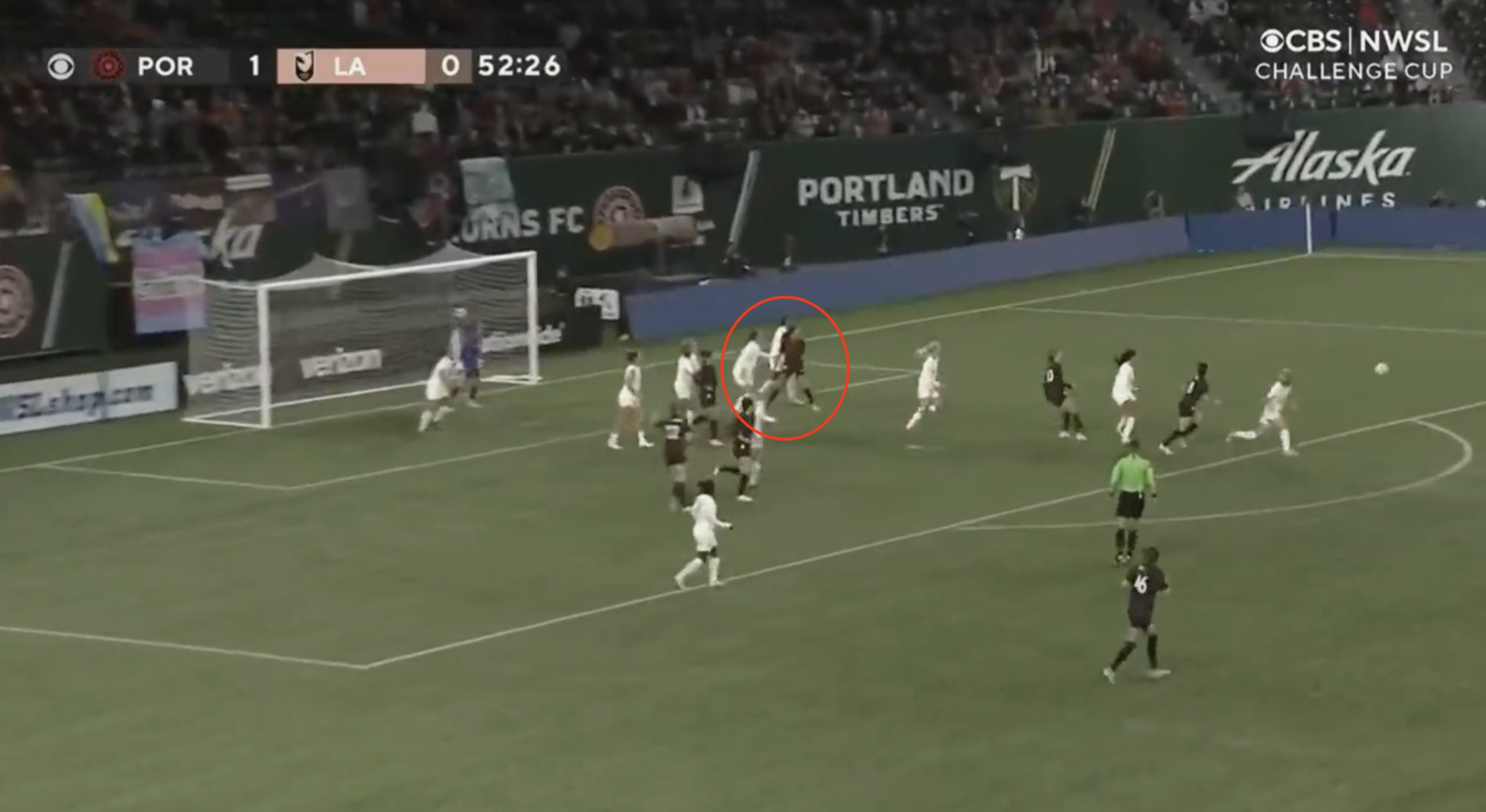
Ryan, circled in red, is watching Kuikka set up her shot. Once it goes off, she is able to turn on the inside of her defender and be prepared for the rebound. Her positioning here is what allows her to easily deflect the path of the ball into the back of the net. All of the Thorns were heads up during this play, with Kelli Hubly even with Ryan and ready to receive the ball if the initial shot didn’t make it.
Weaver recorded her first Thorns goal of 2022 in the final 15 minutes of the game.
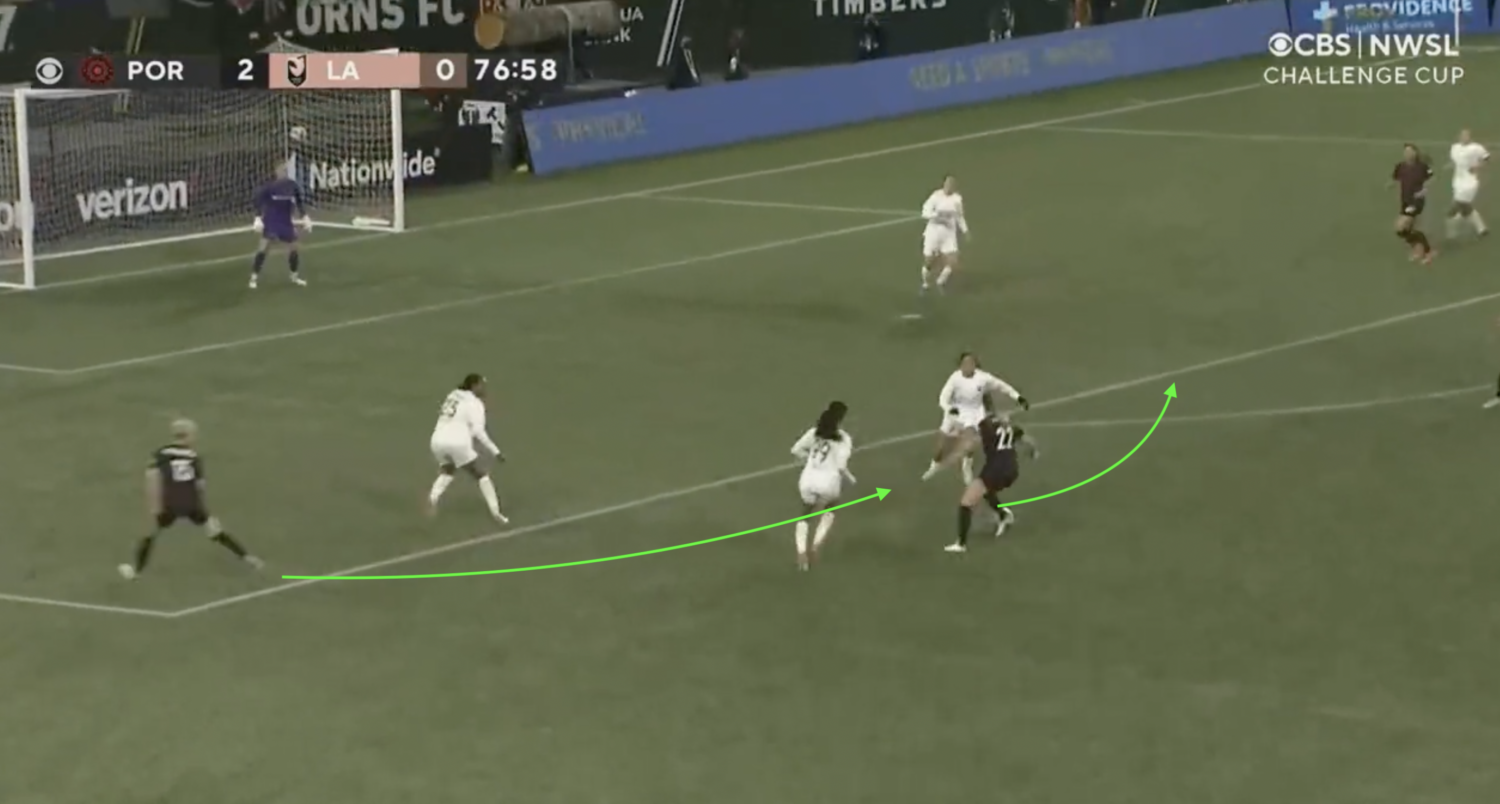
Madison Pogarch, coming back from injury and earning her first minutes of the year, was playing as a winger (finally one step closer to playing as a forward) and intercepted the ball high up the pitch. She controlled it, and passed it to Weaver at the top of the box. Weaver was able to swing the ball across her body into the open space in the arc. Both the defenders were crashing onto her left side, and by simply changing the direction, she was able to open up the entire goal. She then sent an absolute screamer curling into the side netting. Much like Smith, her goal is one that she has been repeatedly working on in practices and on her own time. As the season progresses, we can only hope that she will be prolific in front of goal.
Challenge Cup group play is halfway over, and the Thorns remain undefeated. As they go against each team in the West once more, the Thorns’ depth will be tested. But, if they keep finding the space in front of goal as they did against Angel City, they should end up with plenty of points from these next three games.
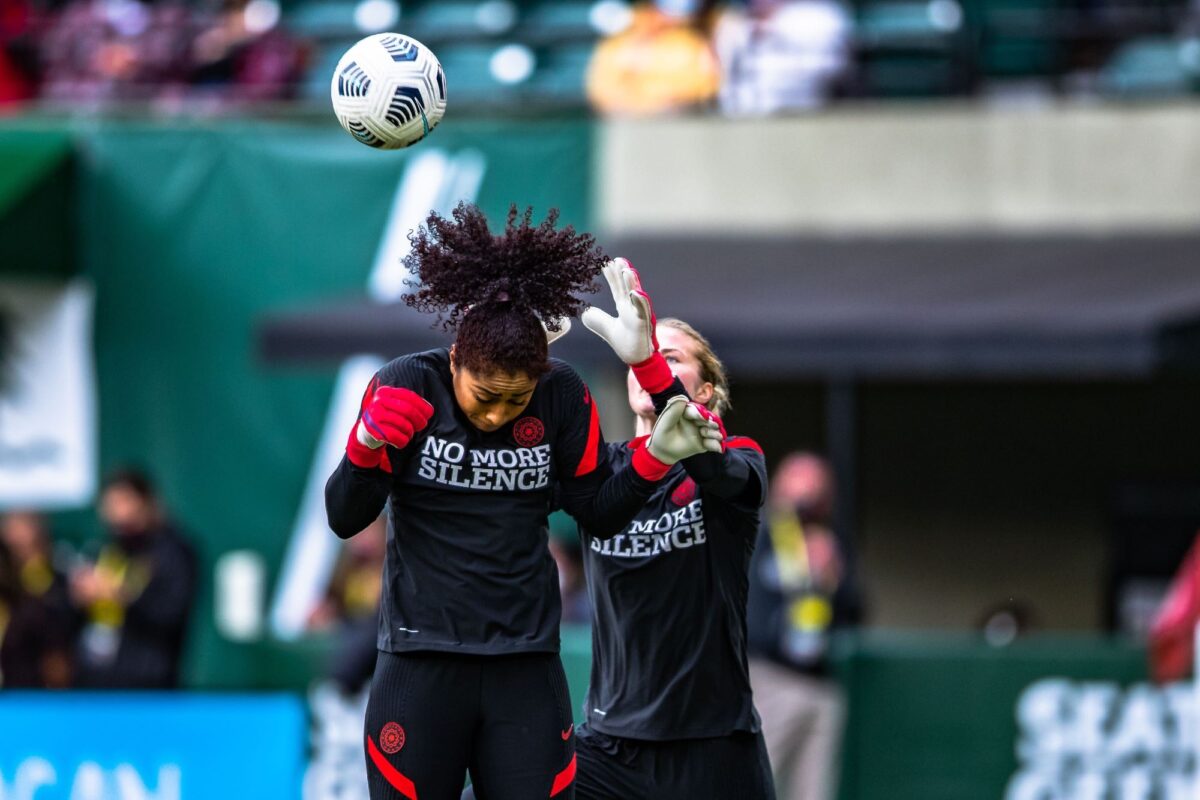
The Thorns look very different than when they stepped off the field in 2021, and two games into a preseason tournament, they are still finding their footing. Without being too critical of the team, there are plenty of bright spots to take away from the inaugural Thorns versus San Diego Wave game.
Saturday night’s game marked the professional Thorns debuts of Abby Smith and Natalie Beckman. Both players appeared in the preseason games and showed new head coach Rhian Wilkinson that they had valuable skills. Although Beckman only played about 10 minutes coming in for Klingenberg, she looked confident on the wing as part of the Thorns’ five-back and should be an exciting prospect in the games to come. Smith has plenty of NWSL experience, most recently for the Kansas City Current, but had yet to make an appearance for the Thorns since signing mid-season in 2021.
In her inaugural game, Smith registered seven saves and a clean sheet, making her the fourth Thorns keeper to record a clean sheet in a Challenge Cup match. The decision to start Smith over Bella Bixby, Thorns No. 1, was a collaborative one between head goalkeeper coach Nadine Angerer, Bixby, and Smith. Head coach Rhian Wilkinson said post-game that it was Bixby’s suggestion to have Smith play so that Smith has the minutes and confidence to fill in when Bixby is unavailable. Smith also spoke highly of the Goalkeeper Union in Portland and how all keepers push one another and inspire greatness. With such a solid culture in goal, any of the Portland keepers should be able to control the backline.
Saying that Sophia Smith is good at soccer is probably the understatement of the year. Her technical skill and ability to get in behind the backline has already proven to be crucial to the Thorns’s attacking strategies. Sinking three out of three shots on target, Smith is lethal in front of goal. However, in the game against the Wave, Smith showed that she is more than just a pacey striker. In the run up to the Thorns’s lone goal, Smith was able to draw out three San Diego defenders to surround her, leaving both Natalia Kuikka and Christine Sinclair with plenty of space on the wings to send a ball in that Smith hit one-time deftly around Sheridan.
Post-game, Wilkinson had high praise for Smith. She cited that Smith not only has a high ceiling that she delivers on, but that she is able to quickly implement feedback. One thing that Smith and Wilkinson are working on is “when to go in behind defense on transition and when to hold back to create different types of scoring opportunities.” With the combination of skills she possesses, it is a no-brainer that Smith will be a crucial member of the Thorns this year.
Sam Coffey, Yazmeen Ryan, and Meaghan Nally all got the start on Saturday. With Becky Sauerbrunn out after undergoing surgery to repair her meniscus, Nally has been able to slide into a starting role on the backline. She didn’t look out of place in the slightest alongside veteran defenders Emily Menges and Kelli Hubly, registering the highest number of touches and completed passes of the three.
Ryan and Coffey, alongside Hina Sugita, are working to rebuild the midfield that the Thorns lost in the offseason. Together, the two young players in their first full season with the Thorns have already impressed. As the holding midfielder No. 6, Coffey had nearly an 80% passing completion rate. She was able to exploit the wide open spaces left by the non-existent Wave midfield, and looked as though she controlled the field. As she gains more experience and confidence on the field, she will be a real force to be reckoned with. Finally, Ryan also worked hard in the midfield, completing several successful dribbles to bring the ball into the final third, playing in Smith. As both Sophia Smith and Ryan get more time together and their partnership solidifies, they should be a lethal duo on the left.
The Thorns go again tonight at home for their inaugural match against Angel City FC as they continue their run to secure their second Challenge Cup championship.
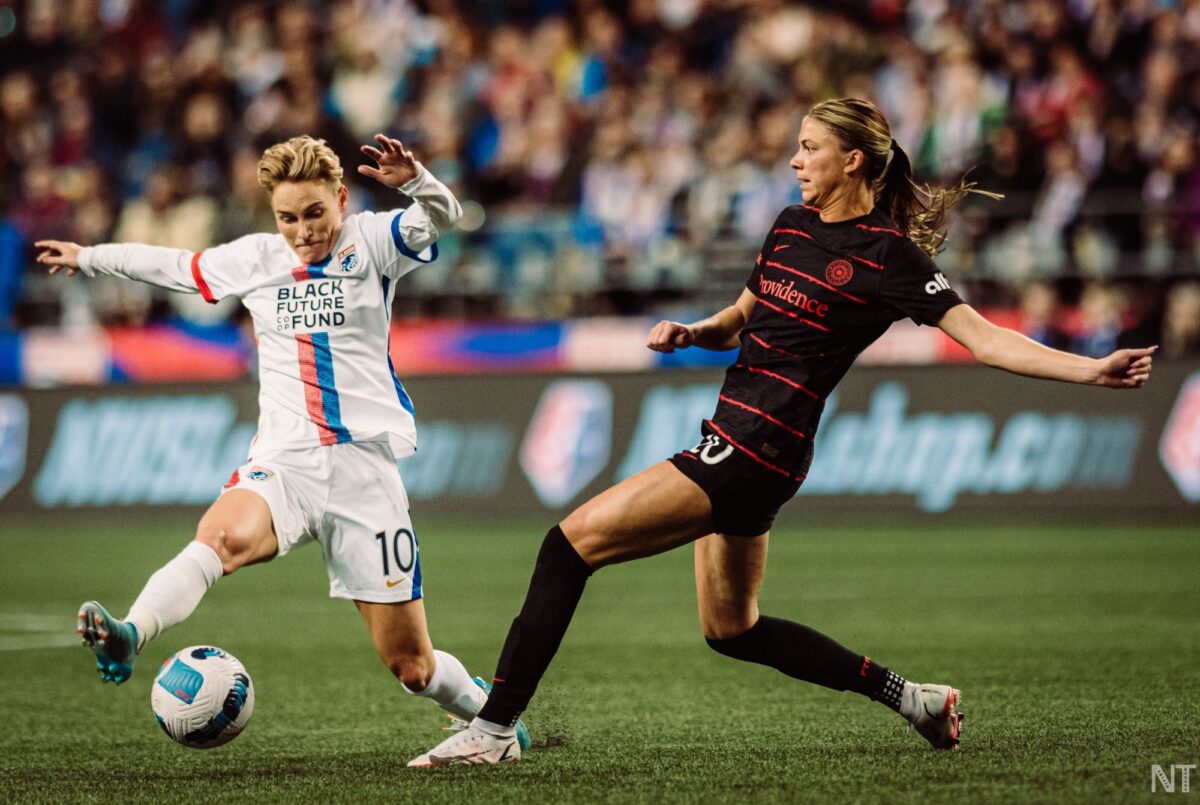
It’s Challenge Cup time again, and the Thorns opened their tournament on Friday with a 1-1 draw to OL Reign. Even with a couple missed chances, it wasn’t a bad start to Portland’s first non-preseason game of 2022—and it left us with a lot of positives for what this team can become.
The Thorns are generally a team that have high expectations for themselves—take just last year, when they set out with the goal to “win everything”—and they’ll want better than a draw. But with a new team and a new head coach and a number of key players out, I don’t think we can read the team’s performance or the game’s outcome as a bad result.
Thorns head coach Rhian Wilkinson put it best in the postgame press conference. “I thought the team put in a performance, in a lot of ways, that we can be proud of,” she said. Although she said that Portland has room to grow, and that they did miss a couple good opportunities, “they gritted out a tie, and winning teams get points on the road. I was really proud of that piece of it.”
Not only did the Thorns pick up a draw, but they did so without the likes of Crystal Dunn, Madison Pogarch, Rocky Rodríguez, and Becky Sauerbrunn.
Those absences—along with the temporary departure of Lindsay Horan and Angela Salem’s retirement—meant Friday night’s Thorns were in a very different position from last year. Instead of leaning on an internationally-experienced midfield that had at least a couple years in Portland’s system under their belt, the Thorns started relatively young midfield that hadn’t really played together before. Hina Sugita and Sam Coffey—while both clearly very talented—are new to the team, and Yazmeen Ryan played less than 400 minutes in the regular season last year.
It’s not surprising that it took the Thorns a second to settle in. In the opening minutes of the match, Portland looked happy to give the Reign time on the ball, sitting back using pressure to force OL to play out of the back.
In Sauerbrunn’s absence, the Thorns also started Meaghan Nally in defense, who had played 19 minutes for Portland in 2022. Despite a dodgy moment early on, she grew into the game and helped hold Portland to one goal against. Wilkinson called her “unflappable” after the match.
“It took us a second to get organized and communicate a little bit better,” Christine Sinclair said after the match, “but I think we figured it out pretty quickly.”
Even though it was fun to watch Portland’s midfield settle in and more effectively contain world class players like Jess Fishlock and Quinn, I’m not sure how much to read into that performance. Rodríguez, Dunn, and, presumably, Horan will be coming back into the fold as the season progresses, and I won’t be surprised if Wilkinson experiments with formations as she and the players get used to working with each other. Still, Coffey, Ryan, and Sugita all put in solid shifts on Friday, and I’m excited to see how they develop as the season progresses.
“We’re definitely up for the challenge,” Sinclair said, “and we’re only going to grow more and more each game.”
And as the Thorns grow into this new iteration of the team, they’ll still have the likes of a number of more experienced players to lean on. Sinclair, Natalia Kuikka, and Sophia Smith showed as much with the goal they worked to create against the Reign.
Sincy on the spot. #BAONPDX | #NWSLChallengeCup pic.twitter.com/sqm1d1cwHd
— Portland Thorns FC (@ThornsFC) March 19, 2022
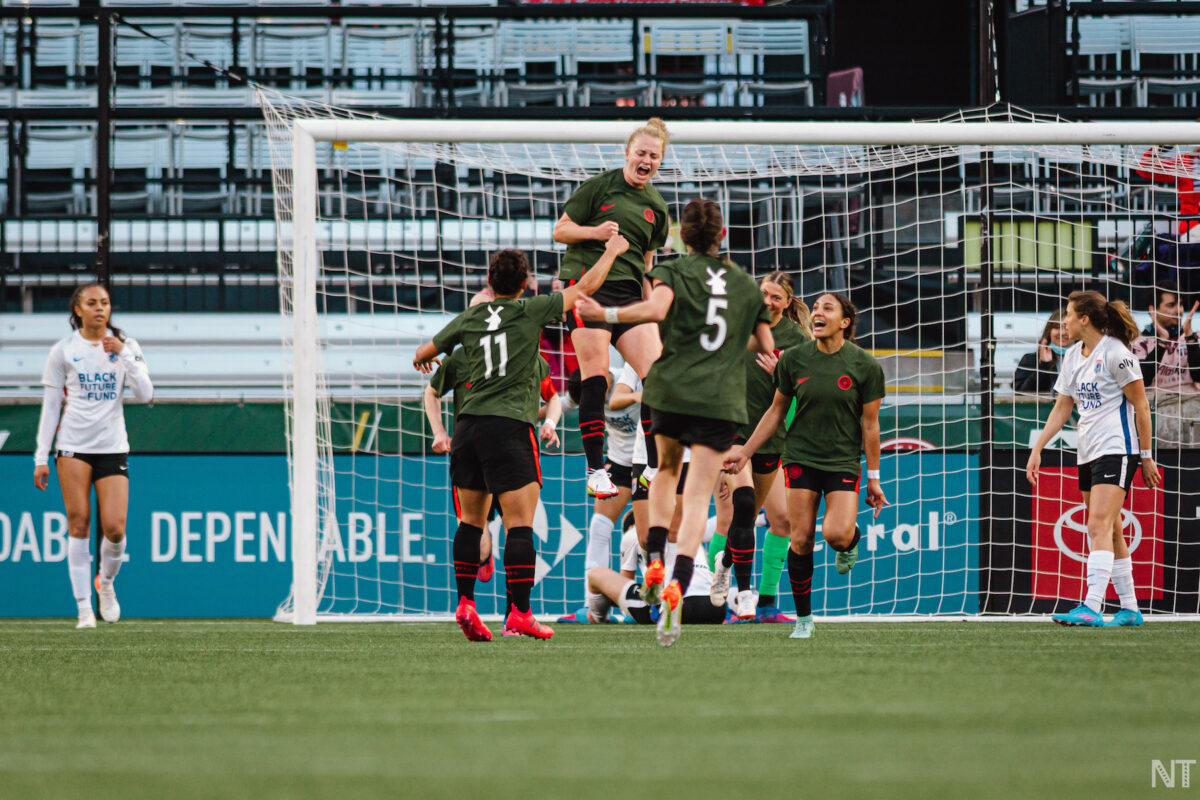
The Thorns have their first open-door match of 2022 on the books in the form of a 0–0 draw against OL “ol’ Reign” Reign. Rhian Wilkinson’s first game! The Thorns wore green! Let’s talk about it.
With Lindsey Horan gone, the Thorns have no choice but to come up with a completely new system. I’m not sure most fans are really prepared for what losing Horan means, which may be partially my fault and that of my media peers, since I don’t know that we’ve collectively emphasized enough how pivotal she was in the Mark Parsons era. So, to be clear: having Lindsey Horan is like having an extra player on the field. She’s a living cheat code. She was such a presence for the Thorns that she was almost easy to take for granted, like the sun.
It’s not that Portland never got results without her—the clashing NWSL and international schedules meant they had to do that plenty of times when she was on the roster—but I get the sense that the collective awareness of her importance was almost unconscious. Her contribution to the team wasn’t scoring worldies as much as it was that she’d show up and everything on the field would suddenly work better. The discourse when she was available wasn’t “Horan looked good today,” it was, “the Thorns looked good today.”
All this is preamble to the fact that Wilkinson is doing something very, very different with this team. The squad lined up like this:
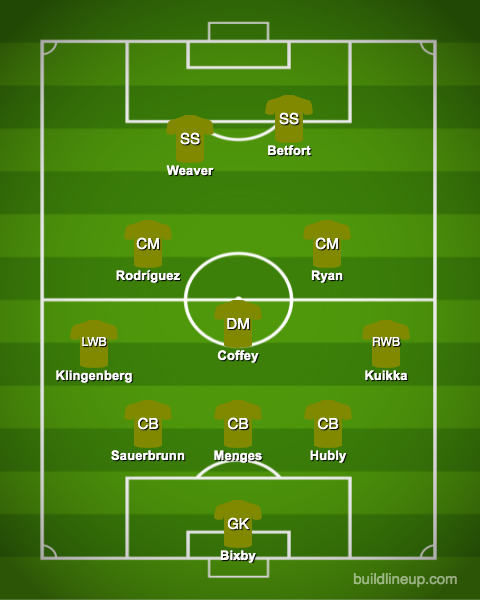
In a word, the game was unspectacular. Whenever they lost possession, the Thorns would drop straight into a neat block; Morgan Weaver and Hannah Betfort would pester a center back or two to keep things moving, but the counterpress of the Parsons days is long gone. Natalia Kuikka and, to a lesser extent, Meghan Klingenberg, played pretty defensively, spending more time cutting off Reign attacks up the wing than looking to go forward themselves. Sam Coffey sat in a sharply defined No. 6 role, using none of the creativity she displayed at Penn State. Postgame, Rhian Wilkinson had this to say about using Coffey in that role:
Sam, even when I first brought her in, her calmness on the ball—she’s got ice in her veins. She’s been like that since day one, just like, “give me the ball.”… In that way, I really believe in midfield strength and connection. And I like her at the six, I think that she really comes alive, and she connects our team. We have a number of players that can do it. But I wanted to put her in the fire really, and see how she did. And I think she gave you all a glimpse of the talent that she has.
Thorns attacks were sparse, with a handful of chances in the first 15 minutes, then another handful in the last half hour. An early goal by Betfort—a header from close range off a corner by Weaver—was waved off for a foul. Most of the chances came from exploiting the spaces left open by Seattle’s press, with Kelli Hubly and Becky Sauerbrunn both connecting directly with the forwards a few times.
Betfort is listed as a defender, but Wilkinson says she sees her as a striker, and had this to say when comparing her with the other forwards on the roster:
Morgan and Sophia Smith are pure athletes. They’re incredible with their feet, technically, as well. Hannah has also got a lot of speed… the other two have a little bit more quickness, she has pure speed. And she’s very obviously a big strong woman who holds the ball out well for us. And she’s got clean feet for someone who is sort of one of those air quotes “old-school” kind of nines, as holding the ball up, she’s got really tidy feet. And I think she likes to play in a different way, where the others pull the line back, she often comes off the front.
The Thorns haven’t had a good old-fashioned shit-kicking nine in some time, and I enjoyed watching Betfort in that role.
In the midfield, Portland often looked outmatched. They were visibly frustrated with the Reign’s press, and Rocky Rodríguez and Yazmeen Ryan struggled to get past Quinn and Jess Fishlock. They’re both excellent creative players, but with a No. 6 who isn’t tasked with contributing much to the attack, no No. 10, and two forwards who tend to stay forward more than drop back to connect play, they couldn’t build much out of the center of the field.
But what we saw last night is not Portland’s best XI. Hina Sugita got about ten minutes in the No. 8 at the end of the match, about which all I have to say is: everybody new to the NWSL has to get that initiatory “why are they like this” moment out of the way. Smith came on in the 74th minute looking sharp as hell and immediately improved the connection between the midfield and the forward line. Also, Crystal Dunn will not be pregnant forever.
The defense was last night’s strong point. Hubly, Sauerbrunn, and Emily Menges are an outstanding central trio and contained just about everything the Reign threw at them. Whatever hiccups happen with the front five as the season gets rolling, Portland will be able to lean on that defensive foundation for results.
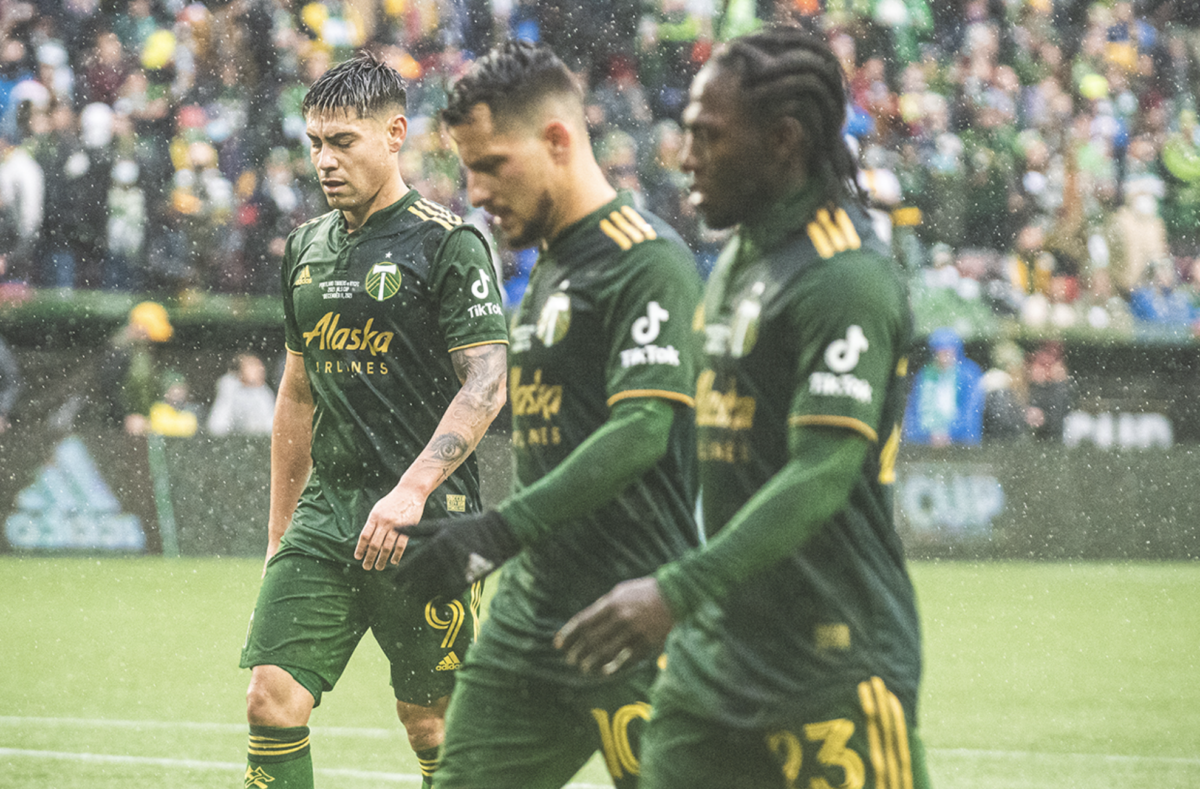
With just days to go until the start of the 2022 MLS season, the Western Conference promises to be as competitive as it’s ever been before.
For the first time, the West is up to 14 teams — adding a quality side in last year’s third-place Eastern Conference finisher, Nashville — as expansion side Charlotte FC take their place in the East. (There is no expansion side in the Western Conference this year.)
Several of the West’s worst teams last season, such as Houston and Dallas, have splashed out club-record transfer fees on new strikers. As the Timbers get set to defend their Western Conference crown, there will likely be few easy games.
1. Seattle Sounders
That’s right. After their humiliating exit from the playoffs last year, the Sounders enjoyed an outstanding offseason.
There’s a sparkling new training facility and a rebrand centered around the club’s 50th anniversary underway. Seattle signed the best player on the team that eliminated them last season in Albert Rusnak. They inked several stars to contract extensions. And they brought several incredibly important depth pieces back.
Brian Schmetzer’s teams have not always been all that good in the regular season, but — given Seattle’s CONCACAF Champions League ambitions and the depth on this roster — this year may well be different.
The front six, which includes five internationals and an ace Brazilian central midfielder, is probably the league’s best unit. The back five isn’t far behind.
If Seattle has had an obvious flaw in recent years, even at full strength, it’s that they could be beat in transition and often played methodically. That necessarily hasn’t changed — but on their day, this team is going to take some beating.
Lineup: Frei, Nouhou, Arreaga, Gomez Andrade, A. Roldan, C. Roldan, J. Paulo, Rusnak, Lodeiro (C), Morris, Ruidiaz
2. Los Angeles FC
LAFC’s regression in the final two years of Bob Bradley’s tenure at the club felt both unnecessary and disappointing. Unnecessary because so many of the club’s personnel moves didn’t make sense, and disappointing because the 2019 team was so tremendous to watch.
Now, the club has turned the page entirely from its hugely successful first era. Bradley is in Toronto; Eduard Atuesta and Diego Rossi are overseas; and new boss, Steve Cherundolo, has a bevy of new recruits to plug in around mainstays like Carlos Vela and Latif Blessing.
Interestingly, many of those new players came from within MLS, a marked departure from LAFC’s player acquisition strategy the last several years. Kellyn Acosta, Ryan Hollingshead, and Maxime Crepeau have played in and won a ton of MLS games. Given the issues LAFC had gutting out wins last season, the team should benefit from their experience.
At no point during the last two years did the underlying numbers ever not like LAFC, and it feels like even a touch more composure and toughness could put them on track to have an excellent year. If Cherundolo can adapt quickly to the league, they’ll be contenders again.
Lineup: Crepeau, Hollingshead, Mbacke, Murillo, Escobar, Acosta, Cifuentes, Blessing, Rodriguez, Vela (C), Arango
3. Nashville SC
Nashville makes the move from the East back to the West for their third year and first in a new soccer-specific stadium. The travel will be grueling, and the lack of games against their geographic rivals in the South seems like a missed opportunity.
They’ll likely shift back to the East when St. Louis joins next season, but for now Nashville should have the quality to make a serious impression on the West.
This team easily could have advanced to the Eastern Conference Final last year, and they strengthened in key areas in the offseason — adding MLS veterans like Sean Davis and Teal Bunbury to compete for minutes in the spine of the team.
Nashville isn’t exactly thrilling to watch, and they won’t blow many teams away, but they’re very difficult to play against, very good defensively, and in every game have two of the best players on the field with Walker Zimmerman and Hany Mukhatar.
They still may be one or two attackers short when it comes to competing with the league’s very best. But they’re built for consistent regular season success, no matter what conference they’re in.
Lineup: Willis, Lovitz, Romney, Zimmerman, Maher, Muyl, Godoy, McCarty (C), Leal, Mukhtar, Sapong
4. Portland Timbers
Last year, on the field anyway, it was the tale of two seasons for the Timbers: very, very poor through mid-August, and very, very good after.
That was almost enough to win the club’s second MLS Cup, and definitely enough to give the its leadership faith that the Larrys Mabiala/Diego Chará/Sebastian Blanco core has another title run in them with just a few reinforcements.
There is good reason to believe. Chará and Blanco, when healthy, remain elite — two of MLS’s most impactful players. There’s plenty of talent around them, too, particularly in the midfield and attacking positions. Giovani Savarese has never missed the playoffs as a manager; there are few better tournament coaches in the league.
But if Blanco gets hurt, or Chará gets old, or the defense looks more like the unit that was shipping goals last summer than the one that locked things down in the fall, the Timbers will fall off in a hurry.
Lineup: Ivacic, Bravo, Zuparic, Mabiala, Van Rankin, D. Chará, Williamson, Y. Chará, Blanco, Asprilla, Mora
5. Sporting Kansas City
In many ways, Sporting is the model of consistency in MLS: Their manager, Peter Vermes, is entering his 14th season at the helm, and his teams are always well drilled. Lately that means they get veteran leadership, value the ball, and try to control games with it.
It works — mostly. Save for the COVID season of 2020, Sporting hasn’t missed the playoffs in ten years. They also haven’t been to the Western Conference Final since 2013, in large part because of a lack of team speed and a tendency to fade in seasons.
This team right now looks no better or worse than any of the last five or six Sporting teams: They’ll have quality players in attacking positions, they’ll play cohesive soccer, and they’ll rack up a bunch of points at home.
But they’ll still likely get run over in transition by faster, more explosive teams, and even on occasion less talented teams like RSL in the playoffs last year. In addition, center forward Alan Pulido is out for the year, leaving a huge question mark.
Unless Vermes has something up his sleeve, this Sporting team will be solid, but limited.
Lineup: Melia, Sweat, Ismat-Martin, Fontas, Zusi (C), Espinoza, Kinda, Walter, Russell, Salloi, Shelton
6. Colorado Rapids
People around MLS waited years for Robin Fraser to get another managerial opportunity, and the Rapids have benefitted handsomely for giving him the controls two years ago.
They’ve also built their roster very well by stockpiling proven MLS players, young American players, and a select few internationals, and inserting them into a clearly defined system. It worked exceptionally well last year, when the Rapids cleared the 60-point mark and topped the West in the regular season.
But there’s little indication that this year’s side is better than last year’s. Kellyn Acosta and Cole Bassett are both gone, and Austin Trusty is headed off to Arsenal in the summer. The key offseason acquisitions, Bryan Acosta and young attacker Max Alves, don’t inspire a ton of excitement.
The glaring issues the Rapids had last season — namely, the lack of a standout center forward or truly elite attacking players — remain the glaring issues right now. This team has a high floor, but very possibly a low ceiling.
Lineup: Yarbrough, Esteves, Trusty, Wilson, Abubakar, Rosenberry, Acosta, Price (C), Kaye, Lewis, Rubio
7. LA Galaxy
Ah, the Galaxy. It’s been quite a few years now since this team was the unquestioned class of MLS in the Bruce Arena/Robbie Keane era, and quite a few years in a short stretch where the team has faded down the stretch and failed to make the postseason.
This year, it looks for all the world like the Galaxy will again be right in the middle of the pack.
The attack, spearheaded by a locked-in Chicharito, should be excellent. Whether or not Douglas Costa produces, the combination of Hernandez, Kevin Cabral, and the inimitable Victor Vazquez pulling the strings will produce plenty of goals.
Defensively, there’s no real indication that this team will be markedly improved from the one that conceded 54 goals last year. They need better individual performances from their backline and more steel in central midfield. Is Mark Delgado the player to give them that? We’ll see.
Greg Vanney has a very good track record, and the Galaxy did improve in his first year, but this will likely remain an entertaining work-in-progress.
Lineup: Bond, Villafaña, Williams, Coulibaly, Araujo, Raveloson, Delgado, Cabral, Vazquez, D. Costa, Hernandez (C)
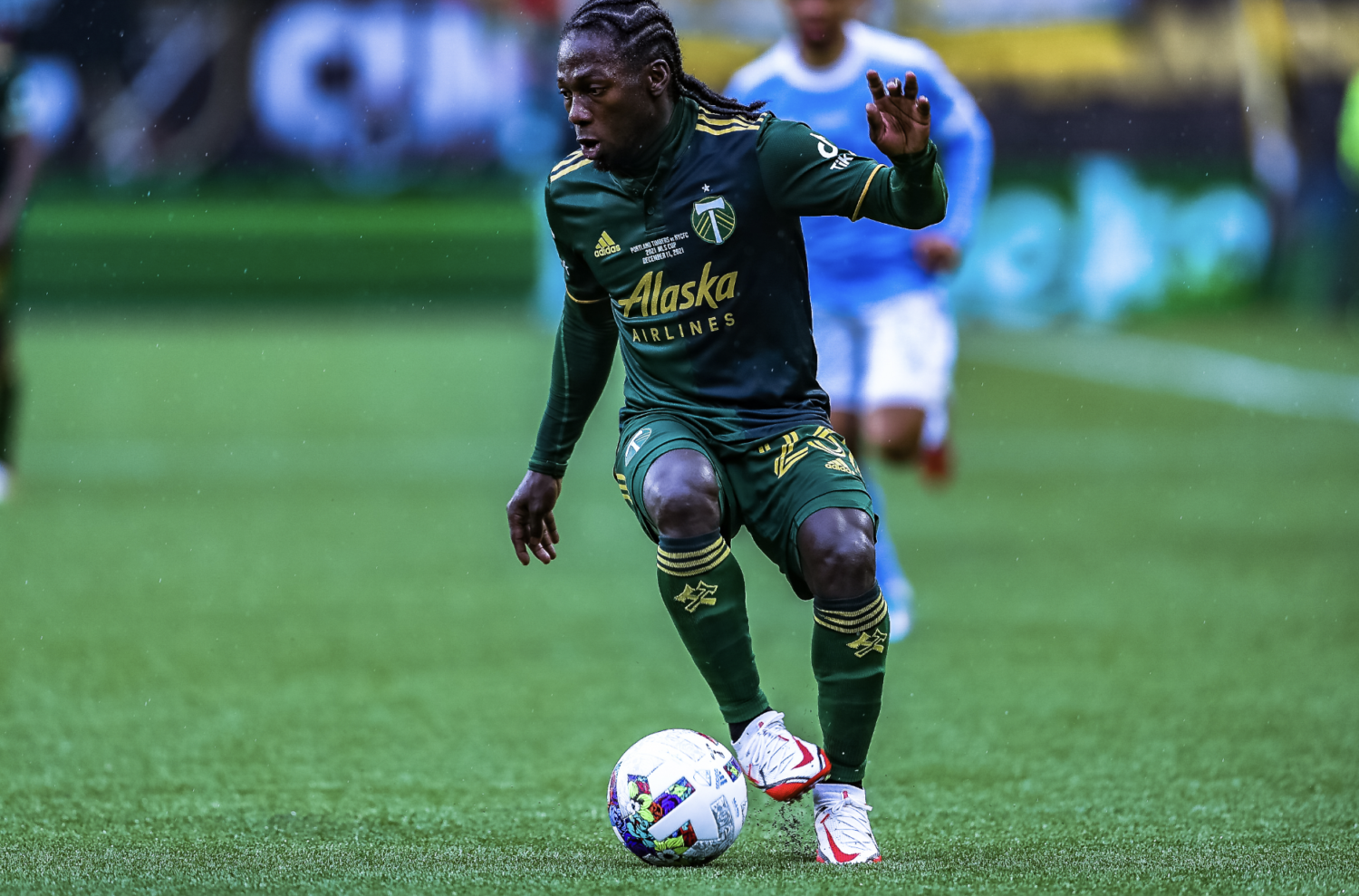
8. Minnesota United
This is year six for Adrian Health in St. Paul, and it feels like his team has stagnated somewhat: After fielding a very competitive team in 2019 and nearly making it to MLS Cup in 2020, the Loons regressed last year, struggling to score goals and getting handily dispatched by the Timbers in the first round of the playoffs.
The offseason, following that 3-1 loss, has been rather indifferent. The club re-acquired striker Luis Amarilla and brought in Honduran midfielder Kevin Arreaga, but lost captain Osvaldo Alonso and kept the bulk of last year’s side intact.
There’s certainly quality enough here to ensure that the Loons are professional and competitive each time they take the field, but aside from Argentinian playmaker Emanuel Reynoso, there are very few elite players in the squad.
Will that be enough to make a fourth straight playoff appearance? Possibly. Will it be enough to do serious damage in the playoffs should they get there? Unlikely. This team needs some pop, both up front and at center back, and until they get it, I’m betting on another regression this year.
Lineup: Miller, Gasper, Dibassy, Boxall, Métanire, Trapp (C), Dotson, Fragapane, Reynoso, Lod, Hunou
9. FC Dallas
Dallas appeared adrift at the end of last season when they fired manager Luchi Gonzalez and were on their way to selling Ricardo Pepi for a club-record fee. There were serious questions about the ownership’s commitment to winning.
Those questions, in one offseason, appear to have been answered. Dallas was aggressive from the outset, and ended up singing Alan Velasco from Independiente and committed huge amount of money to a trade for Paul Arriola. They also brought in a new coach, Nico Estevez, who will install a new 4-3-3 formation.
Best of all, perhaps, is the possibility of a full year of Paxton Pomykal in midfield. He has the ability to be a top MLS player if he stays fit, and a could be a creative hub behind what projects to be a lethal front three.
Defensively, there are more questions than answers: How much does Matt Hedges have left in the tank? Who is the starting goalkeeper? Overall, Dallas promises to be more interesting than they have been since the Oscar Pareja era.
Lineup: Maurer, Farfan, Martinez, Hedges (C), Nanu, Quignon, Servania, Pomykal, Arriola, Velasco, Ferreira
10. Vancouver Whitecaps
Between the pandemic and an MLS investigation into the club for its handling of allegations of misconduct against two former Whitecaps women’s team coaches, it has not been an easy few years for Vancouver supporters.
But, the way the team played at the end of last season under then-interim coach Vanni Sartini was one small bright spot. They went for it in the months following the sacking of Marc Dos Santos, and, improbably, reached their first postseason since 2017.
We’ll see whether they can keep that momentum going this year, and — particularly — whether they can play as aggressively over the course of an entire season and get away with it.
Their standout goalkeeper, Maxime Crepeau, is gone and, while Ryan Gauld is here for the entire campaign, the front office made few reinforcements to a team that, talent-wise, is not among the West’s best.
Lineup: Hasal, Dajome, Jungwirth, Veselinovic, Blackmon, Brown, Alexandre, Teibert, Gauld, Caicedo, White
11. Austin FC
There was, despite overwhelmingly poor results, plenty to like about Austin’s expansion season: They played cohesive attacking soccer in Josh Wolff’s system, they valued the ball, and they were clearly just a few pieces away from competing for a playoff spot.
Austin tried to get those pieces in the offseason, though the jury is very much out on whether they did enough work on last year’s roster to give themselves a chance to compete all the way into the fall.
Jhojan Valencia has arrived to play defensive midfield, while Ruben Gabrielsen and first round draft selection Kipp Keller will slot in the for the likes of the retiring Matt Besler in central defense. The defensive spine of the team was a major area of need, and Austin addressed it.
The problem is that none of those players have any MLS experience, and none appear to be the kind of proven, show-stopping defender that would improve the unit on day one. This team will score goals and stay in goals more than they did last year, but it doesn’t look like a playoff team on paper.
Lineup: Stuver, Kolmanic, Romaña, Gabrielsen, Lima, Ring (C), Valencia, Fagundez, Druissi, Dominguez, Djitte
12. Real Salt Lake
It was a wild finish to last season in Utah, in which the club saw its manager leave to become an assistant for one of its rivals, get bought by a new ownership group, and then make an improbable run to the Western Conference Final.
RSL got waxed by the Timbers in that game at Providence Park, but they did enough to land Pablo Mastroeni the full-time coaching job and generate a springboard of goodwill to take into 2022.
Now, the hard part. RSL lost its highest profile player in Albert Rusnak to Seattle, the same club their former manager Freddy Juarez joined in the middle of last year, and they haven’t really replaced him.
In fact, this team, which played plucky and brave soccer last year, but rarely very good soccer, hasn’t been improved much at all. Only one player has come in, and while more signings may be in the offing, RSL just isn’t going to scare anybody at the start of the year.
Mastroeni was mostly very aggressive tactically when he got the job last year, but that meant that his team was often wide open defensively. We’ll see if he decides to change tack with more to lose personally this go around.
Lineup: Ochoa, Brody, Glad, Silva, Herrera, E. Luiz, Ruiz, A. Julio, Kreilach, Rubin, Wood
13. San Jose Earthquakes
This looks set to be the final year of the great Matias Almeyda experiment in San Jose, which started with such promise in 2019 and has since fizzled into an acrimonious wait for the end.
Almeyda gave an interview where he ripped the club’s player-acquisition strategy in the offseason, and it’s true that San Jose was lapped in spending ambition by the likes of Dallas and Houston this offseason, not to mention the LAs and Seattles of the conference.
It’s also true that this ‘Quakes team has enough talent to be competitive — though it’s an open question whether Almeyda’s man-marking system, or whatever hybrid of it he uses, in whatever formation, helps or hinders them this season.
In Cade Cowell and Jeremy Ebobisse, there’s some exciting attacking talent. Offseason pickups like Jamiro Monteiro and Jan Gregus are proven in MLS. The roster build looks a lot like Colorado’s from a few seasons ago, even if the overall vision looks less cohesive.
It’s not hard to see San Jose causing some problems for teams this year. But it’s also not hard at all to see the whole project falling apart relatively quickly.
Lineup: Marcinkowski, M. Lopez, Alanis, Nathan, Thompson, Judson, Yueill, Cowell, Monteiro, Espinoza, Ebobisse
14. Houston Dynamo
It is very clearly a new era in Houston. The club is under new ownership, and that new ownership appears eager to spend and revitalize a team that has slid so far from relevancy in its city that even its biggest games last season were sparsely attended.
The first order of business was bringing in proven MLS sporting leadership in former goalkeeper Pat Onstad to run the front office and Paulo Nagamura to manage. The next order of business was spending big to acquire Paraguayan forward Sebastian Ferreira for a club-record fee, and there will likely be one or two more big name DP signings to come.
For now, though, this is still largely the team that trudged through last season under Tab Ramos, struggling on both sides of the ball, with effort week in and week out, and with a not inconsiderable talent deficit to boot.
Steve Clark, as Timbers fans can attest, will help in goal. The center back partnership anchored by Tim Parker looks a strength. But until the Dynamo bring in a pair of high-level attacking midfielders and a two-way center mid, the ceiling will be low.
Lineup: Clark, Lundqvist, Hadebe, Parker, Zeca, Vera, Rodriguez, Carrasquilla, Quintero, Picault, Ferreira